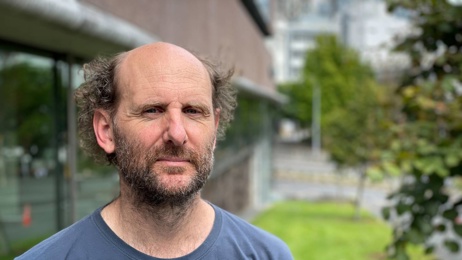Police claimed "progress" on Wednesday as 12 cars moved on from blocking streets around Parliament, while also conceding a larger number had in fact moved in to replace them.
A car is yet to be towed as protesters enter day 10 of the "village" they have built on Parliament grounds, with a tow truck industry spokesperson saying the job could require two dozen companies.
Police claimed "progress" on Wednesday as 12 cars moved on from blocking streets around Parliament, while also conceding a larger number had moved in to replace them.
Assistant Police Commissioner Richard Chambers, who is leading the operation about the anti-mandate protesters at Parliament, estimated 450 vehicles were blocking surrounding streets.
Meanwhile more than 20 protesters have gathered outside Wellington's District Court, ahead of many reappearing for their trespass charges today.
Police Association president Chris Cahill said the protest was a "bit of a dog's breakfast" and the bad news was that he thought they would still be there in three months' time.
Cahill told Newstalk ZB the bunch of people sitting in tents on the Parliament's lawns weren't going to upset businesses and should be left there.
But he said the cars affecting businesses and other New Zealanders going about their daily lives needed to be moved.
"We have learned if we let the things build, they get totally out of control," he said.
It was not an easy situation to deal with and they had significant issues getting assistance to tow vehicles.
"When they did try a bit of proactive moving on Thursday last week, it didn't work. It just swelled the numbers dramatically."
National Recovery Alliance - a group of seven Auckland towing companies - spokesperson Chris Ratcliffe said it would take two dozen tow truck companies and take a day to clear the area.
Ratcliffe said while some companies weren't interested, others would be looking to make up some of the losses suffered over lockdown and be willing to take risks.
It was unclear how many tow trucks would be needed, but they could look to garner about 20 trucks which could probably clear 400 vehicles within a day or so.
This didn't take into account moving the bigger vehicles.
"Towies are a pretty tough bunch so they can usually handle a little bit of abuse. The challenge I guess they have is around physical safety.
"If trucks were substantially damaged or vandalised, there would be a six month wait to replace these vehicles."
He was sure they would get a bit of extra money for doing this job, but the reality was how much extra justifies the risk.
Broadly speaking, most of the towing industry supported the vaccine and the bigger question was whether the mandates should still be in place.
/cloudfront-ap-southeast-2.images.arcpublishing.com/nzme/MYY53KXM5WU2ZW7WLIRKXTGSJE.jpg)
Police at the protests at Parliament in Wellington. Photo / George Heard
Four Defence Force vehicles had been seen arriving in Wellington, however, with a spokeswoman saying there were "being pre-positioned should they be required".
Chambers said police needed to think about how best to manage the situation without it escalating, while dealing with the protest "influencers".
"We are making small steps," Chambers said.
"I can't tell you this is going to be resolved tomorrow, but we are seeing encouraging signs from that fact a small number of vehicles have left and there were no major incidents.
"We are making confident, albeit small, steps forward."
However, protesters the Herald spoke to shortly after said they had no intention of moving on, and comments on social media channels suggest the leaders spoken to may have limited influence among the wider protest group.
Asked why there were no attempts to remove the tents on day one, when there were only a handful and given it was also illegal at that point, Chambers said he could not confirm when a request had come from the Speaker of the House to remove them.
As the occupation enters day 10, reporters at the scene have noticed the presence of protesters steadily growing each day, with still hundreds of tents covering Parliament lawn and each and every blade of grass - and even gardens - nearby.
/cloudfront-ap-southeast-2.images.arcpublishing.com/nzme/4TZG5UAMMWIYL4VHF35YKPZOSI.jpg)
The number of tents on site have been increasing every day. Photo / George Heard
There is also an increasingly settled presence, with well-organised and stocked food services, medical tents and daycare, and even the odd homemade street sign.
The portaloos are cleaned and serviced regularly, and straw has been laid over the entire grounds to soak up any mud from the weekend's deluge.
There are at least three musical stages, where different bands and DJs play throughout the day and into the early evening, giving an almost festival atmosphere, with even their own "security" working to maintain peace and discouraging any alcohol and drug use.
There has been minimal tension or violence on site since the mass arrests on Thursday, however there continue to be reports of some protesters abusing passers-by and even of those presenting a petition around Oranga Tamariki reforms.
Green Party co-leader Marama Davidson was present for the petition and said the vibe was "intimidatory".
"It was also overriding a really important kaupapa about protecting our children as a nation. In all honesty, I was infuriated by the interaction."
Davidson said she'd had to change her security plans due to the protesters.
Despite assurances from organisers the protest is peaceful and focused on removing vaccine mandates, at the site remain signs promoting violence against politicians and journalists.
These are widespread online in social media channels, with even talk of violent, military-style takeovers.
/cloudfront-ap-southeast-2.images.arcpublishing.com/nzme/MSQ5Y6SHBE34SF7HHCFJVQFQLA.jpg)
A yoga session on day 9 of the protest. Photo / George Heard
Asked about these threats and the risk profile Chambers said he wouldn't comment on anything specific but the safety of "everybody" remained their focus.
Protest leaders have called for politicians to engage with them, and with that sense of calm Act Party leader David Seymour said the time was ripe for a "mature conversation" about de-escalation. He met with some of the leaders on Wednesday.
"A large part of their concern is they feel no one's listening to them," he said.
Seymour said political leaders would not meet with protest leaders as long as abusive and threatening behaviour continued.
He said on the other hand, dehumanising protesters or calling them "feral" was highly unhelpful.
"One of the things that's clear is it's becoming increasingly organised."
Prime Minister Jacinda Ardern admonished Seymour, saying she did not think it was a "responsible thing to do for a party that champions law and order".
"Every party should be focused on two things, making sure we're working hard to protect New Zealanders during this pandemic and second thing is that there is activity outside that has tipped into illegal activity.
"The focus needs to be removing the illegal activity blocking Wellingtonians lives."
Speaking to reporters Ardern also said she was concerned foreign money could be funding the protest.
"I certainly couldn't rule out a connection with groups offshore," she said.
Seymour this morning defended meeting the protesters and said it was time to start speaking with them.
Once they stopped disrupting nearby businesses and the university and ended the more aggressive behaviour, it was then time to begin dialogue, he told AM.
"No one can support threats and so on. You can't be talking about liberties while you are making threats of violence," he said.
"These people are human, they are part of New Zealand and at the end of this we need to glue this country back together."
While it was possible to disagree with the nature of the protest and some of the earlier incidents, he said the wider question was when did New Zealand end this way of life and get its freedoms back.
This was something a lot of New Zealanders wanted an answer to and the protest was "just a concentrated form of the frustrations they have with an ongoing, controlling and cack-handed response to Covid".
He said solving the overall situation would be a lot more challenging.
"I just hope that we can look at this situation in a more mature way than most people have so far and try and get to a stage where people aren't in the vicinity of Parliament."
He believed some people were now protesting against the Government's response to the protest.
Take your Radio, Podcasts and Music with you









